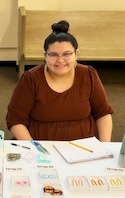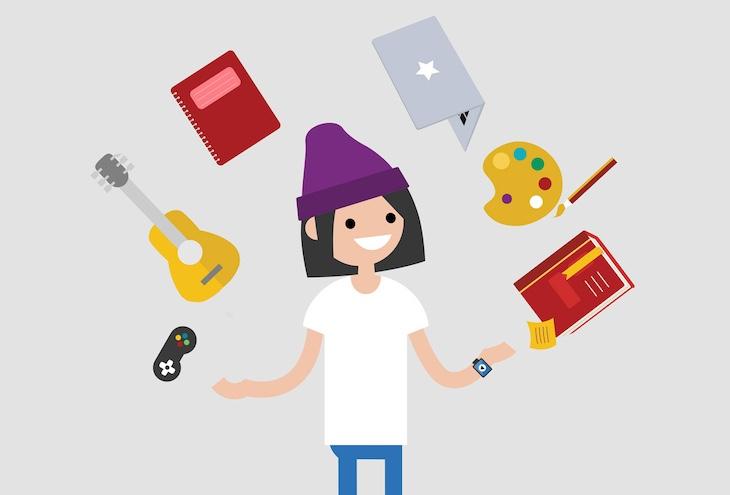Life as a student is busy. You’re so focused on your classes and upcoming tests, projects, and assignments you may think there’s no room in your schedule for hobbies. A recent Gallup survey found that hobbies are growing in importance for Americans, so don’t just cast them aside. Instead, look for ways to incorporate your hobbies into your schedule — you'll thank yourself for it.
Brain Break
Time is a precious commodity, and most people think they don’t have enough of it. Between classes and studying, you may feel stretched thin. A recent study in Nature Medicine found that individuals with hobbies were happier than those without diversions. Making time for other interests allows your brain to take a break from the pressure of the classroom and engage in a different way. It might not be easy to find the time for your favorite pursuits, but it's well worth the effort.
Stop Procrastinating
According to the market research website Gitnux.org, college students spend approximately one to five hours per day on social media. While some of it may be educational, there is likely a chunk of time that can be redirected. Those excessive hours on social media could be spent doing homework, participating in physical activity, engaging in a creative activity, or socializing. Cutting back even slightly on your daily social media scrolling will pay off in more flexibility in your schedule. You’ll likely find you have better focus on your studies and more time for your hobbies.
Don’t Overcommit
It’s tempting to want to be involved in clubs, sports, and other extracurricular activities, but don’t overcommit. Prioritize one or two hobbies that you are passionate about so you don't spread yourself too thin. Be mindful of your schedule because the goal is to reduce stress and improve productivity. Allow yourself the flexibility to adjust your schedule as necessary to ensure that you strike a nice balance.
Take Care of Yourself
Getting appropriate rest, eating well, and allowing yourself some grace as you navigate academic responsibilities and outside interests are critical to your well-being. Your mental and physical health should always be a priority. If you find that you’re doing too much, take a step back; if you find that you need more stress relievers, pursue independent hobbies as well as school-sponsored activities.
While your academics should be your top priority, developing outside interests is important too. Hobbies provide a break from the rigors of academia and open ways for you to explore your passions. Finding the right balance between your studies and your hobbies can be challenging, but don't give up — you'll be happier and healthier for it.
ON TOPIC
 Hannah Overlie, University of North Dakota School of Medicine and Health Sciences
Hannah Overlie, University of North Dakota School of Medicine and Health Sciences
Hannah Overlie is currently pursuing her master of public health at the University of North Dakota School of Medicine and Health Sciences, where she also earned a BS in psychology with an emphasis on pre-health. As an undergraduate, she served as an AISES student representative. We talked to Overlie about her passion for beadwork and how she manages to balance her rigorous coursework and her beading.
When and how did you become interested in beading?
I was introduced to beading by my grandma and mum when I was around eight or nine years old. I first learned how to make daisy chains and medicine pouches to get used to the needle and threading beads on needles. I’ve always been interested in arts and crafts, and I also was a jingle/fancy shawl dancer at our powwow celebrations. My grandma would tell me if I wanted to keep dancing as I grew up, I needed to learn how to make my own beadwork and dresses as well as help family members make their regalia sets.
How does having a creative outlet help you balance the stress of graduate school and other responsibilities? How does it keep you grounded in your Native culture?
Beading helps me to utilize my culture to apply practices and lessons I’m learning in my Masters of Public Health program, as I’m also specializing in Indigenous health. Our cultural practices historically were and continue to be important for our health. Beading has been carried through many generations in my family, so having that spiritual connection to my ancestors helps me know that I am where I am supposed to be. I can look to them for guidance as Creator aided them as well.
Your work is beautiful — what is most rewarding about sharing your talent with a larger audience?
The pieces I love creating are those that are going to be gifts or for the person ordering, especially if they are a friend or family member. That’s because when I’m creating the piece, I think about that person — who they are and what they’ve done — and I want to make sure it fits them in their own way. Another is being able to teach others all that I’ve learned along my 20-plus years of experience. I’ve always been someone who wants to learn anything and everything and then share what I know with others because they may not have had the opportunity to do so or didn’t know how to ask.
With anything in life — beading, school, and family — patience and compassion are important. We must not only show others patience, but ourselves too. The best way to learn this is by spending time with, praying to, and listening to Creator. He does communicate with us if we are willing to take the time to pause and listen to what He envisions for us.
Learn more about Overlie and her beadwork here.














